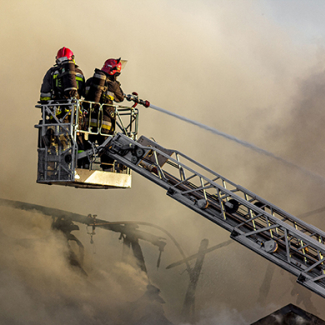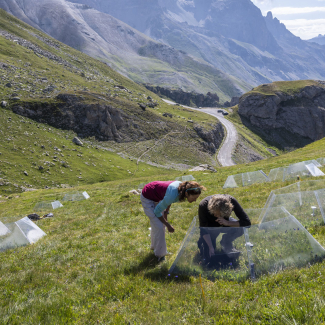Collective scientific expertise
Based on rigorous methodology, and ensuring both quality and objectivity, institutional scientific expertise aims to enlighten public decision making and debates relating to major societal issues.
Scientific expertise in the service of public decision making and debate
Based on the multidisciplinary strength of the CNRS, collective scientific expert reviews gather and analyse dispersed scientific knowledge on an international level. The key objective is to help understand complex societal issues at the request of public decision makers, or via self-referral. Each expert review culminates in a report, a synthesis, and a summary accessible to a large audience.
It is distinct from research activity or studies aiming to produce new knowledge, or individual productions of expertise for the media, enterprises, etc.
This activity is overseen by the Mission for Scientific Expertise (MPES), which mobilises scientific collectives in accordance with a rigorous methodology ensuring the quality as well as the credibility of the expert review:
Instruction
Completion
The MPES organises and supports the work of groups of experts, who produce a cross-referenced analysis of the subject.
It does so by mobilising researchers and scientific leaders from different disciplines, who are identified based on their scientific contributions in the field. These experts analyse a corpus consisting of thousands of scientific publications collected by documentalists. They collectively draft a full report and conclusions, with the latter also appearing in the form of a synthesis and a summary approved by the group.
Showcasing expertise
The expert review culminates in a published work, with all of the documents (report, synthesis, summary) being made available on the CNRS website.
The results of the expert review are presented during a report submission conference open to a broad audience.
The CNRS Institutional Scientific Expertise Charter
The CNRS Institutional Scientific Expertise Charter outlines four fundamental principles that ensure the quality and credibility of scientific expertise:
Competence
Transparency
Independence
It is based on the confidentiality, throughout the review process, surrounding the expert review and the names of experts, with a view to protecting against external influence and potential pressure. This independence is strengthened in advance before expert selection by gathering and analysing their interests or ties in order to prevent conflicts of interest.
Impartiality
It stems from diversity within the composition of the group of experts, as well as the fact that the expert review proceeds via cross-referenced analysis of a bibliographic corpus constituted according to a rigorous method rather than a point of view.
The CNRS actors involved in collective scientific expertise
The MPES
Created in 2022 within the CNRS Scientific Office, the Mission for Scientific Expertise (MPES) proposes and implements the CNRS’s strategy for institutional scientific expertise. It supervises the various stages of the expert review process in conformity with the CNRS Expertise Charter, in collaboration with CNRS management and governing bodies.
Contact: mpes@cnrs.fr
The Scientific Expertise Steering Committee
The Monitoring Committee
It includes the entity requesting the expert review, representatives from CNRS scientific management, leaders, and the MPES. It is specific to each expert review, and takes part in framing and monitoring it.
Scientific leaders
Experts
Ongoing expert reviews
CNRS scientists tasked with conducting an expert review are held to a certain reserve throughout the effort. All requests for information regarding ongoing expert reviews should be sent, with respect to the CNRS, to the MPES (mpes@cnrs.fr).
Scientists who would like to participate in an expert review are invited to present themselves to the MPES (mpes@cnrs.fr), indicating the title of the expert review in question, justifying their competency in the field of expertise, and attaching their CV.
Completed expert reviews
Each collective scientific expert review culminates in a public report. This report is collectively approved by the group of experts, whose composition it presents. The CNRS is not responsible for the uses made by the reports and syntheses it publishes.
Other expert reviews involving the CNRS before the creation of the dedicated institutional mission
Eutrophication: manifestations, causes, consequences and predictability (November 2017)
This expert review was coordinated by the CNRS in partnership with Ifremer and Irstea at the request of the Ministry of Agriculture and Food and the Ministry of Ecological Transition, with funding from the French Biodiversity Agency.
Summary
Eutrophication is the most visible manifestation of the pollution of water by organic matter and nutritive elements (nitrogen, phosphorus) arising from human activity. It results in excessive algal growth and the depletion of water oxygen concentration, leading to major disturbances for aquatic ecosystems. It has an impact on human health and associated activities, thereby making it a socially sensitive issue.
This expert review provides a critical overview of the available international scientific knowledge on the causes, mechanisms, consequences, and predictability of eutrophication. It also strives to clarify the definition of eutrophication by taking into account the land-sea continuum. In considering the needs and operational issues relating to public action, it identifies levers for action in addition to the scientific obstacles that require the acquisition of new knowledge.
Incestuous sexual violence against minors (April 2017)
Expert review coordinated by the CNRS at the request of the ministries in charge of children and research.
Summary
The question of incestuous sexual violence committed against children is hampered by many taboos and prejudices. As part of the first plan to combat and mobilise against violence against children (2017-2019), this expert review offers an overview of current knowledge from a gender perspective, emphasising a number of analytical prospects: socio-historical analysis of collective representations, reflections on quantification, positive penal law and the study of closed court cases, neuro-developmental and psychological consequences, and psychological support.
It will advance knowledge of the phenomenon from the standpoint of numerical data, overall understanding, and consequences as part of a dynamic perspective of support for public policies. It suggests avenues of thought for research (neuroscience, collective behavioural science, gender and sexuality studies, legal studies, etc.), in addition to raising awareness, training, and care.
The environmental impact of the exploitation of deep-sea mineral resources (June 2014)
Expert review coordinated by the CNRS and Ifremer at the request of the Ministry of Ecology and the Ministry of Research.
Summary
Increase in global demand for metals has translated into renewed exploration for mineral resources, including in the deep sea, which represents potentially large metal deposits. The environmental impact for the exploration and exploitation of these mineral resources should be assessed, in addition to their economic consequences. Very little is currently known regarding the ecology of the ecosystems associated with these mineral resources, in addition to their links and interactions with more distant sites. Furthermore, the ecological services provided by these sites or their uses can affect the conditions for their exploitation.
In the framework of the national programme for research and access to deep-sea mineral resources, this expertise provides an exhaustive critical review of scientific findings regarding the environmental consequences of the exploration and exploitation of deep-sea mineral resources. It highlights gaps in knowledge, questions, and uncertainties, and suggests avenues of research to be pursued. Intended for all ocean-related stakeholders, this expert review can illuminate the development of public policies relating to applications for exploratory mining permits. It can also strengthen France’s role in the development of an ambitious marine research and innovation strategy, taking into account environmental requirements and envisioning the conditions for a sustainable exploitation of the deep sea bed.
- Executive summary in French (11 pages)
- Synthesis in French (100 pages)
- Collective expert report in French (937 pages)
Herbicide-tolerant plant varieties. Agronomic, environmental, and socioeconomic effects (November 2011)
Expert review coordinated by the CNRS and INRA at the request of the Ministries of Agriculture and Ecology.
Summary
Since crop weed control is a decisive factor in yields, selecting plant varieties that can tolerate the application of an existing herbicide substance can offer farmers a technical solution to the difficulties of weed control. Their cultivation is also presented as a means of reducing the quantity of herbicide used. These plant varieties nevertheless raise questions. What are the medium- and long-term effects of their cultivation? What role could they play in policies seeking to reduce the use of pesticides?
This expert review provides the most comprehensive overview possible of knowledge regarding the impact of obtaining and using herbicide-tolerant varieties, via a multidisciplinary approach combining the life sciences, economics, and the social sciences. It highlights the problematics specific to these varieties. One of the review’s results shows that repeated use of these varieties could, under certain conditions, make them ineffective over the medium term. This expert review also emphasises the need for weed control that does not solely rely on varietal innovation, but also includes various complementary approaches.
- Summary in English (8 pages)
- Overview in French (88 pages)
- Collective expert report in French (430 pages)
Photo Credit: © Christian MOREL / LISN / CNRS Image







